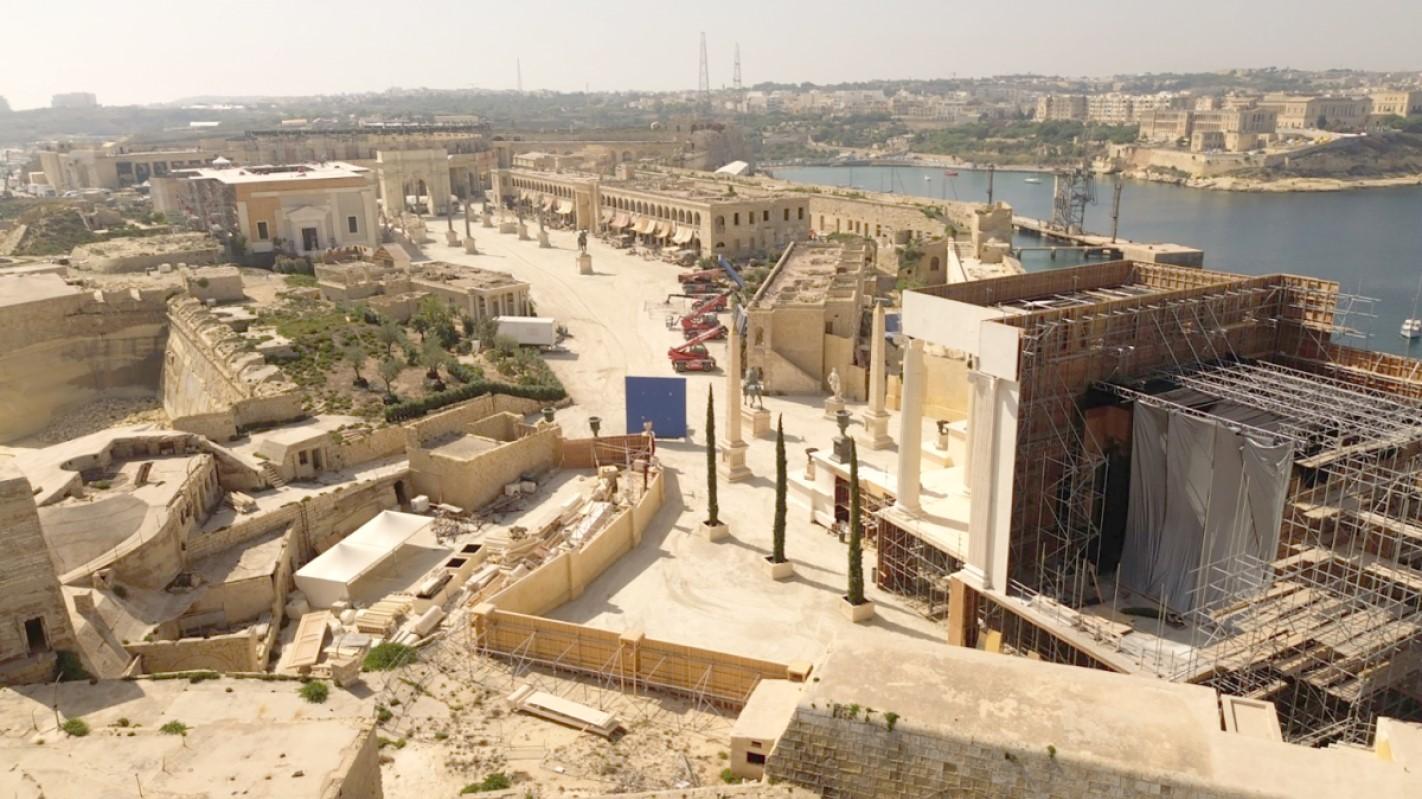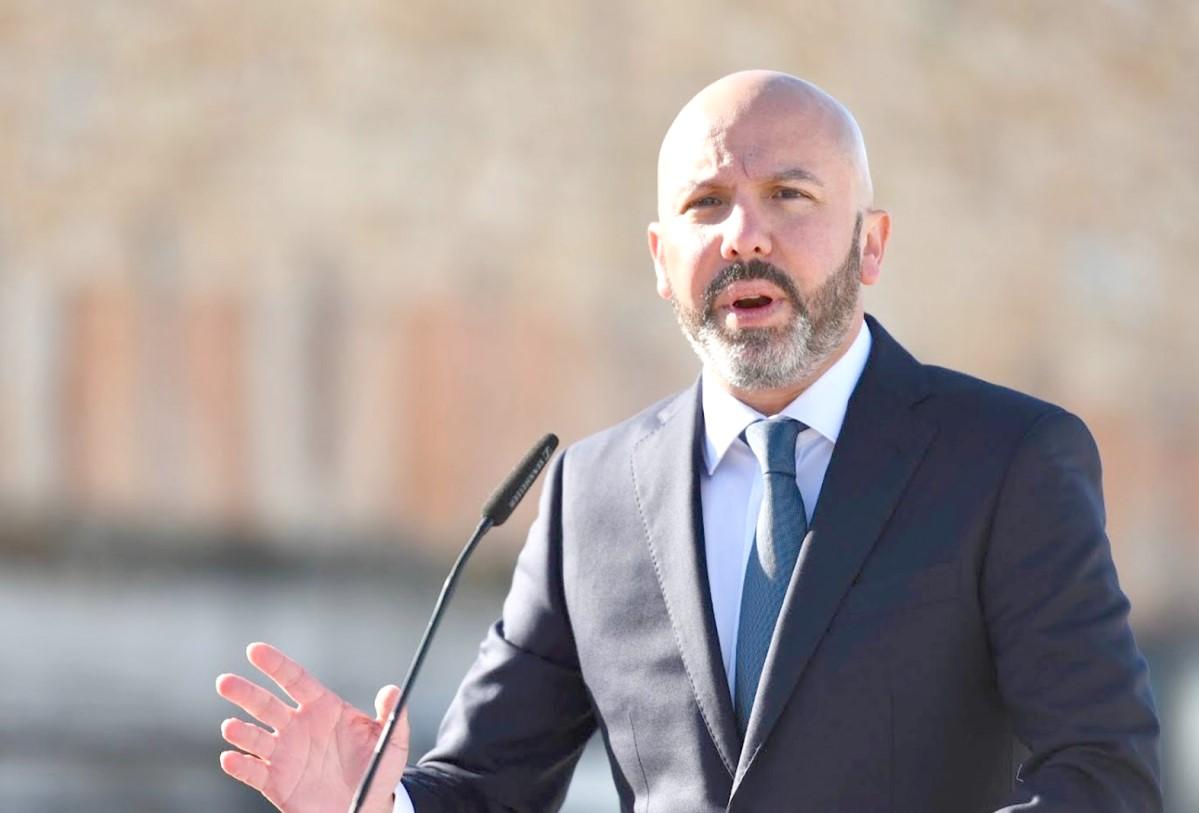- Taxpayers paying millions in salaries to Hollywood actors and directors;
- Film Commission already went over allocated budget by €58 million;
- Government is yet to say where the money will come from and who is approving budget overshoot
Maltese taxpayers will be paying €46.7 million to the film company producing the Gladiator sequel film, official figures reveal.
Through the Malta Film Commission, the government has committed itself to paying €46,653,961 to the subsidiary company of Paramount Studios for the production of Ridley Scott’s sword-and-sandals epic film.
The rebate is part of a generous cash scheme that promises production houses up to 40% cash back if they film in Malta. The rebate breaks the record for the biggest state aid to cinema in the EU.
Official figures emerging from the state aid website of the EU Commission show Italy gave the second biggest rebate, in the form of a tax allowance, to a cinematic production, and that rebate was less than half the rebate Malta is giving to Gladiator.
The government says the scheme is significantly growing the film industry by attracting top Hollywood productions, which in turn inject millions more into the Maltese economy.
But top industry insiders insist that almost half of the big productions’ budget is not spent directly in Malta, even while the production is filming on the island. Productions spend millions on hundreds of crew members brought to work in Malta and to rent and ship equipment from other countries.
A big chunk of the money is spent abroad and only a small fraction of it eventually ends up in the Maltese economy
Of the €46.7 million that Gladiator is getting, for instance, €5 million will go to pay a share of the salaries of actor Denzel Washington, director Ridley Scott and other top cast and crew. Millions more will go to pay the salaries of hundreds of other foreign crew members and actors and to subsidise the renting of high-end cinematic equipment, props, costumes and machinery from other countries.
This means tens of millions of euros eligible for the rebate are spent on services provided by foreign companies and individuals who do not even pay taxes locally. But the Maltese government still reimburses productions with 40 per cent of the money that is not spent in Malta. Industry insiders said only a fraction of the film’s entire spend eventually ends up working its way into the Maltese economy.
The first Gladiator film shot in Malta in 1999, when the cash rebate scheme was yet to be created, had reportedly left around €21 million in the Maltese economy, and the government did not need to return any of that money. “This time round, we’re giving the sequel €46.7 million against a local direct expenditure of not more than €55 million, so we’d be lucky as a country if we manage to end up with €10 million in our economy,” a top industry insider said.
The government claims that last year alone, the industry injected €85 million in Malta but is yet to explain when and how that money made its way into the economy.
Times of Malta asked the Film Commission to break down where the money went and whether the remaining figure left in the economy was estimated before or after the rebates were paid.
In a reply, a commission spokesperson said “the total budget value by film studios and productions was in excess of 85-million-euro last year”.
The Film Commission said it has nothing else to add and that an economic impact study would be published in the coming months.
But the issue has now been further exacerbated following a major strike announced by the Hollywood’s actors union last month, bringing the Gladiator filming to a halt. International actors and crew left Malta and the massive set at Fort Ricasoli was abandoned, effectively blocking the Film Commission from being able to rent it out to other, smaller productions not impacted by the strike. It is unclear how long the strike will last.
Rebates to other international productions
The Gladiator rebate amounts to just a portion of the bill that taxpayers will be expected to foot by the end of the year.
So far this year, the Film Commission has already committed itself to dishing out €69 million in cash rebates to 12 international productions. As a few more productions prepare to start filming in Malta later this year, that figure is expected to shoot up to around €80 million by the end of the year. That is equivalent of almost half of what the government expects to spend on energy subsidies this year.
In this year’s budget, the Malta Film Commission was allocated €11 million for ‘film industry incentives’ – meaning the Commission has already overshot its budget by €58 million, and the figure is yet to increase. It also means that this year alone, taxpayers will have paid as much money in cash rebates as they paid in 16 years combined – between 2006 and 2021. Sixty per cent of all that money is going to the Gladiator sequel.
So far, no minister or government official has said where the money is coming from and who is approving it.
 Fort Ricasoli is providing the backdrop to many of the Gladiator shots. Photo: SJP
Fort Ricasoli is providing the backdrop to many of the Gladiator shots. Photo: SJPForeign producers ‘in disbelief’
Top industry sources say foreign producers are in disbelief at the generosity of the deal.
In an interview last year, Gladiator executive producer Aidan Elliot said the Maltese scheme is “the most generous cash rebate in the world”.
Before coming to Malta with Gladiator 2, Elliot also worked on the Ridley Scott Napoleon biopic here last year, for which official figures show Malta will be paying a subsidiary of Apple – the producer of the film – a cash rebate of €12.8 million for just three weeks of filming.
Malta is merely used as a depiction of other countries in both Napoleon and Gladiator, undermining claims that such big films were advertising the island.
In two years, the two Ridley Scott productions will have received almost €60 million in taxpayer money – equivalent to the entire cost of Renzo Piano’s City Gate project, the parliament building and the Pjazza Teatru Rjal. The government’s entire spend to subsidise free public transport this year amounts to just €40 million.
Industry insiders have long been warning the scheme is not sustainable and say the moment the government is unable to fulfil a commitment with a future production, the whole industry could crumble because producers will lose faith in Malta’s ability to keep its word.
How have rebates become so generous?
Malta has been giving cash rebates since 2005. Back then, productions could get up to 20% back only on local elements of the production. In 2007, expenses incurred from EU companies and individuals also became eligible and productions were given two per cent extra if Malta featured in the story.
The rebate was pumped up to 25% in 2013 and to 40% in 2019 but the rebate was only eligible on local and EU expenses. But last year, Film Commissioner Johann Grech opened eligibility to cast and crew from all around the world and allowed productions to get up to €5 million in rebate for salaries for the main actors, producers and directors.
 Film Commissioner Johann Grech. Photo: Chris Sant Fournier
Film Commissioner Johann Grech. Photo: Chris Sant FournierThe government insists not all of the film’s expenses are eligible for rebate, but industry insiders say that in the majority of productions, over 90% of costs related to the Malta shoot have now become eligible.
The Malta Film Commission spending has been largely shrouded in mystery, drawing criticism from local film-makers who have questioned whether the government is simply throwing money at large production companies to bring big-name films to the island for little more than “personal vanity”.
Local film-makers also question to what extent the rebates improve local cinema. “While Ridley Scott is getting €60m for two films in two years, local filmmakers were given only €1.5m in funding in two years to create Maltese productions and co-productions,” one Maltese film-maker said.
Auditor general Charles Deguara slammed the Malta Film Commission for “extravagance in the use of public funds”, and in his 2020 report on public accounts, said it lacked effective internal controls.
The exorbitant amount of money spent on cash rebates does not even account for the Film Commission’s entire expenditure. The money spent on the controversial Malta Film Awards last year and the Mediterrane Film Festival last June – which are estimated to have cost millions – is over and above the cash rebate scheme.
Times of Malta reported last month how the Film Commission treated visitors of the festival to business class seats, accommodated them in lavish five-star resorts, while some were provided with chauffeur service to drive them around the island.
Tourism Minister Clayton Bartolo and Film Commissioner Johann Grech have refused to answer most questions about the Commission’s lavish spending, insisting it is a good investment in the industry. Bartolo insists a comprehensive report into income and expenditure will be published in a few weeks’ time.
Asked specifically about the rebates, the Film Commission said the cash rebate was first introduced by the Nationalist government and keeps Malta’s film sector competitive in an evolving international marketplace.
“For a film production to access the rebate they must present a list of expenditures which took place in Malta,” a Commission spokesperson said. “Not all expenditure falls under costs which can be rebated. Auditors analyse the figures, and a rebate is issued, following a full independent audit. This is a process that is completely thorough, which is why it takes time for the Commission to issue them.”
There is also indirect expenditure, he said, which is over and above the €85 million. “There are other expenses, like tourism expenditure, that the foreign crew and producers spend ‒ that are not part of the expenditure of the production itself and which results in added extra economic benefit to Malta,” the spokesperson said.
“Stays are often weeks or months long, so that is a positive add-on as crew members and their families spend their own money – as they shop, dine and visit attractions locally. There are also other indirect benefits, such as film tourism, which is a notably growing area. This too, is not included in that figure of €85 million. The ripple effects on our economy are huge.
“We anticipate seeing a further uplift in film tourism in coming years, especially as high-end and global productions choose Malta for their productions. This creates a virtuous circle for the local economy.”
He said the rebates help spread Malta’s brand around the world as it allows foreign audiences to enjoy stunning Maltese locations, all the while increasing people’s awareness about Malta and its attractions through the film itself and the actors’ publicity on social media.
“The film sector brings substantial value to Malta and supports significant and sustainable growth delivering high-skilled, well-paying jobs for local people,” he said.